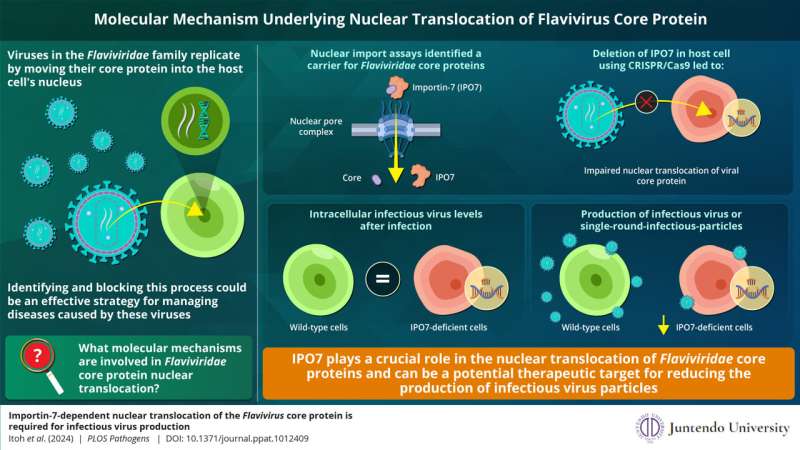This article has been reviewed according to Science X's editorial process and policies. Editors have highlighted the following attributes while ensuring the content's credibility:
fact-checked
peer-reviewed publication
proofread
Newly discovered mechanism for propagation of flaviviruses reveals potential therapeutic target

Viruses of the family Flaviviridae, including Japanese encephalitis virus (JEV), dengue virus (DENV), Zika virus (ZIKV), West Nile virus (WNV), and tick-borne encephalitis virus, are significant arthropod-borne pathogens. These viruses are known to cause severe diseases, including fatal neurological conditions such as Guillain–Barré syndrome, microcephaly, and dengue fever.
With the global risk of such virus-borne diseases increasing, DENV alone is known to cause approximately 390 million infections and 100 million symptomatic cases annually, and JEV around 70,000 cases each year. However, effective treatment strategies for these Flaviviridae-induced infections are lacking, highlighting the urgent need for vaccines and therapeutics.
Traditionally, Flaviviridae were thought to complete their life cycle in the cytoplasm, but recent research has shown that core proteins and NS5 are translocated to the nucleus, crucial for replication.
Identifying the molecular mechanisms involved in the nuclear translocation of core proteins and blocking them could be a promising therapeutic approach for tackling diseases caused by Flaviviridae viruses.
A study published in PLoS Pathogens has now identified a protein named importin-7 (IPO7), as a carrier that transports flavivirus core protein through the nuclear membrane and into the nucleus.
The study was conducted by a team led by Professor Toru Okamoto from the Department of Microbiology at Juntendo University, including Yumi Itoh from Juntendo University and Yoichi Miyamoto from the National Institutes of Biomedical Innovation, Health and Nutrition.
The researchers arrived at these findings using an assay that analyzes the transport of proteins to the cell nucleus. They further confirmed their findings using cells in which the gene producing the IPO7 was deleted using CRISPR/Cas9 technology.
"Our study revealed that IPO7 is a nuclear carrier for Flaviviridae core proteins. With the help of nuclear import assays, we also identified that the core protein was transported into the nucleus via IPO7. When IPO7 was deleted, the core proteins could not enter the nucleus," explains Prof. Okamoto.
To understand how the removal of IPO7 affected the production of viral particles, researchers infected two types of cells with flavivirus—wild type cells with intact IPO7 gene and IPO7-deficient cells lacking this protein.
Despite both cell types showing similar levels of viral load in infected-cells, the IPO7-deficient cells produced significantly fewer viral particles. This suggested that IPO7 plays a crucial role in the efficient production of viral particles, even though the initial viral replication inside the cells was comparable between the two cell types.
Moreover, this finding underscores IPO7's essential function in the flavivirus life cycle, specifically in the later stages of viral particle assembly and release.
The study's findings suggest that blocking the molecular transport mechanism aided by IPO7 after infection by Flaviviridae viruses may help reduce subsequent viral replication, mitigating the health impact of diseases they cause.
A new therapeutic approach for Flaviviridae viruses is highly desirable as effective treatments are not currently available for all diseases they cause in humans, such as dengue fever.
Prof. Okamoto elaborated, "Currently, with the lack of a specific antiviral medication for dengue, treatment mainly focuses on supportive care, including fluid management to prevent dehydration. Developing effective antiviral drugs or vaccines is crucial for managing and reducing the impact of dengue fever, which can cause severe complications and be life-threatening in some cases. Not only Dengue virus but also JEV and ZIKV have no medication for treatment."
In previously published research, Prof. Okamoto and colleagues identified compounds that inhibit the nuclear localization of flavivirus core proteins. These compounds have also been shown to be able to limit viral replication.
With this study, the team led by Prof. Okamoto has gone a step further in identifying a specific mechanism that can be targeted to block viral replication. As Prof. Okamoto explains, the current study builds on this understanding by pinpointing IPO7 as a more specific target for therapeutic development.
He concludes, "Our current finding provides the possibility to generate more specific and efficient inhibitors of nuclear localization of core proteins by targeting IPO7. Our findings might lead to the development of effective anti-flavivirus drugs."
More information: Yumi Itoh et al, Importin-7-dependent nuclear translocation of the Flavivirus core protein is required for infectious virus production, PLOS Pathogens (2024). DOI: 10.1371/journal.ppat.1012409
Journal information: PLoS Pathogens
Provided by Juntendo University Research Promotion Center


















